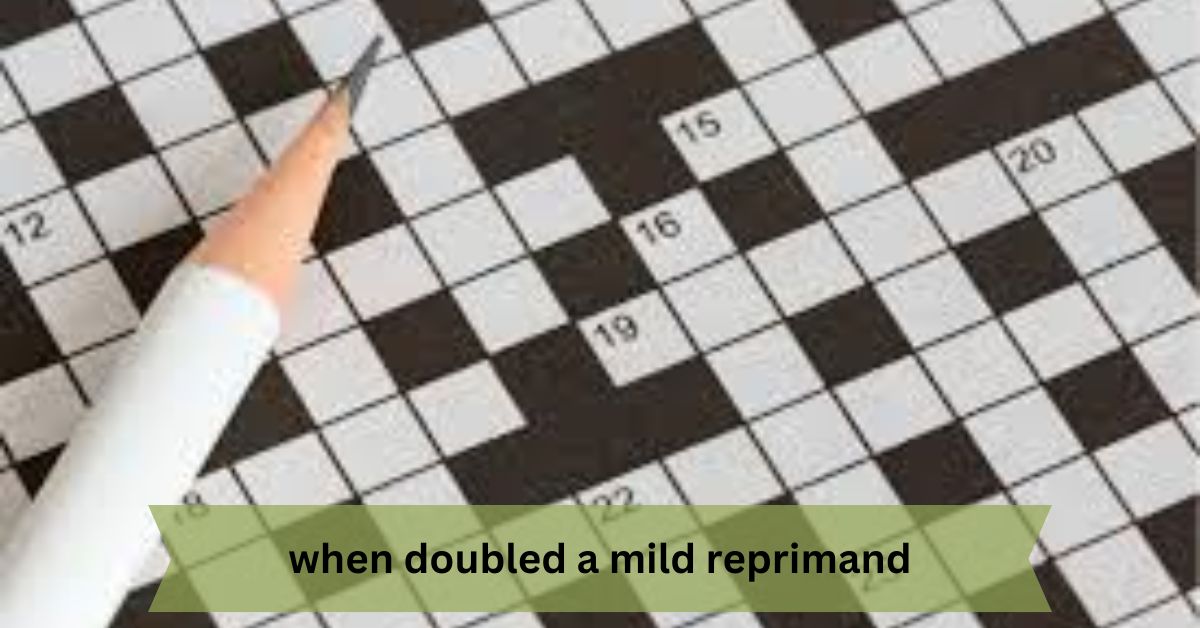Welcome to our exploration of the intriguing phrase “when doubled a mild reprimand.” While it may seem puzzling, it’s a captivating example of wordplay that connects to various linguistic and cultural references. In this article, we’ll decode its meaning, explore related examples, and dive into how this phrase fits into the world of language puzzles.
Table of Contents
- Understanding the Phrase “When Doubled a Mild Reprimand”
- Breaking Down the Phrase
- 2.1. The Literal Meaning
- 2.2. Contextual Interpretation
- Related Puzzles and Wordplay Examples
- 3.1. Hawaiian Dance
- 3.2. Very Friendly
- The Importance of Wordplay in Language
- Insights and Analysis
- 5.1. How Wordplay Enhances Language Learning
- 5.2. The Role of Context in Understanding Wordplay
- FAQs
- Conclusion
1. Understanding the Phrase “When Doubled a Mild Reprimand”
The phrase “when doubled a mild reprimand” is a type of word puzzle where the answer is hidden in the context of doubling a term to get a mild reprimand. Let’s break this down to understand it better.
1.1. What Is a Mild Reprimand?
A mild reprimand is a gentle form of criticism or warning. It’s a way of pointing out a minor issue or mistake without being harsh. Examples of mild reprimands include phrases like “please be careful” or “try to do better next time.”
1.2. The Concept of Doubling
In this context, doubling refers to repeating a word or term to derive a new meaning or to solve a puzzle. For example, if you double a term that means “mild reprimand,” you might end up with a word or phrase that conveys this gentle correction.
2. Breaking Down the Phrase
To solve this puzzle, we need to understand how the doubling of certain words can lead to a mild reprimand. Let’s look at the examples provided:
2.1. The Literal Meaning
When you double a word or term, you repeat it to form a new word or phrase. In the case of “a mild reprimand,” the answer is something like “now,” which is derived from the doubling of “no” (as in “no, no” which is a gentle way to say “no”).
2.2. Contextual Interpretation
Understanding the phrase in context can help in solving the puzzle. In this case, doubling “no” gives you “now,” which can be seen as a mild reprimand in certain situations.
3. Related Puzzles and Wordplay Examples
Let’s explore how similar wordplay works in different examples. These examples will help illustrate the concept of doubling and wordplay in a broader context.
3.1. Hawaiian Dance
One example of wordplay is related to the Hawaiian dance. The answer to this puzzle is “hula.” When doubled, “hula” doesn’t change, but the dance is a traditional Hawaiian performance that represents the culture and traditions of Hawaii.
3.2. Very Friendly
Another example is the term “buddy.” When doubled, it means “buddy buddy,” which conveys a sense of being very friendly. This demonstrates how doubling a term can emphasize its meaning.
4. The Importance of Wordplay in Language
Wordplay is an essential aspect of language learning and communication. It helps in developing creativity, problem-solving skills, and a deeper understanding of language nuances.
4.1. Enhancing Language Learning
Engaging with wordplay and puzzles can enhance language skills by making learning more enjoyable and interactive. It encourages learners to think outside the box and understand language in a fun and engaging way.
4.2. The Role of Context
Context plays a crucial role in understanding wordplay. Recognizing the context in which a word or phrase is used can help in solving puzzles and appreciating the intricacies of language.
5. Insights and Analysis
Here, we’ll provide deeper insights into how wordplay functions and why it’s a valuable skill.
5.1. How Wordplay Enhances Language Learning
Wordplay, such as puzzles and riddles, can make learning a new language more engaging. It helps learners practice vocabulary, syntax, and creative thinking. By solving puzzles, learners can improve their language skills in a fun and memorable way.
5.2. The Role of Context in Understanding Wordplay
Understanding the context is vital for solving wordplay puzzles. The same word or phrase can have different meanings based on the context in which it is used. Being aware of these subtleties can enhance comprehension and problem-solving abilities.
6. FAQs
Q1: What does “when doubled a mild reprimand” mean?
A1: This phrase refers to a type of wordplay where doubling a word or term results in a mild reprimand. For example, doubling “no” gives “now,” which can be interpreted as a gentle correction.
Q2: How do I solve wordplay puzzles like this?
A2: To solve wordplay puzzles, look for terms that can be doubled or altered to fit the context of the puzzle. Understanding the meanings and implications of words is key.
Q3: Why is wordplay important in language?
A3: Wordplay is important because it enhances language skills, promotes creativity, and makes learning more enjoyable. It helps learners understand language nuances and improve their problem-solving abilities.
Q4: Can you provide more examples of wordplay?
A4: Sure! Examples include “buddy” for being very friendly (when doubled as “buddy buddy”) and “hula” for Hawaiian dance. Each example demonstrates how doubling or altering a term can reveal its meaning.
7. Conclusion
In summary, the phrase “when doubled a mild reprimand” is a fascinating example of wordplay that involves doubling a term to get a gentle correction. By exploring similar examples and understanding the role of wordplay in language, we can appreciate the creativity and complexity of language.



